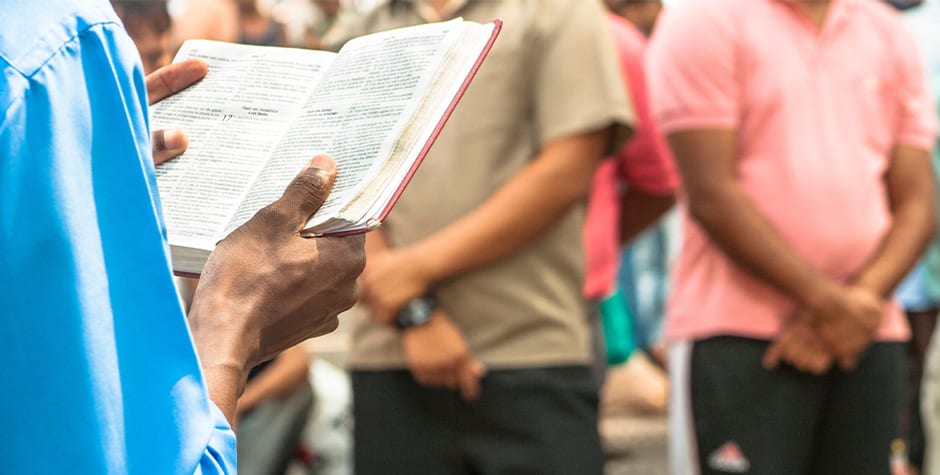Preacher Arrested on the Streets of Chicago for Sharing the Gospel – ACLJ Defending His First Amendment Rights in Court
Listen tothis article
The effort to scrub religion, especially Christianity, from the public square continues, and Chicago is the epicenter of the latest blatantly unconstitutional attack.
The ACLJ is headed to court in Chicago this week to defend the First Amendment rights of a preacher who was arrested on the streets of Chicago for telling people about Jesus. Our attorneys will appear in court on behalf of Brett Raio, a Christian street preacher who faces unwarranted criminal charges for exercising his constitutionally protected right to share his faith in public. Our legal team will represent Mr. Raio against citations for an alleged noise ordinance violation and a questionable charge of resisting arrest.
The facts in this case are straightforward: Mr. Raio was preaching in a public area in Chicago using modest amplification – a practice protected by the U.S. Supreme Court in Saia v. New York (1948). Despite maintaining reasonable volume levels and conducting himself peacefully, he was approached by law enforcement and immediately handcuffed and detained before issued citations for using amplification without a permit and resisting arrest.
The Evidence Speaks Clearly
Our legal strategy centers on two key elements. First, Mr. Raio's own video documentation of the incident demonstrates that he was not creating an unreasonable disturbance and that he fully cooperated with officers throughout the encounter. This video evidence directly contradicts the charges filed against him. He even recorded his own decibel levels, proving that his audio was not unreasonably loud in any way.
Second, we will present the well-established legal precedent that protects religious expression in public forums, including the right to use reasonable amplification to effectively communicate one's message. The Supreme Court has consistently upheld these protections as fundamental to our constitutional order.
Chicago’s Patterns of Enforcement
While Mr. Raio faces criminal charges for peaceful religious expression with minimal amplification, the city has demonstrated a markedly different approach to other demonstrations.
During the widespread civil unrest in 2020, Chicago witnessed Antifa and other radical Left agitators wreak extensive property damage, extended disruption of public spaces, and amplified sound systems that far exceeded any noise levels Mr. Raio produced. Yet law enforcement largely stood down, with minimal citations issued for noise violations or other ordinances. The same pattern has emerged in more recent university protests, where demonstrators have used powerful sound systems, occupied public spaces for extended periods, and disrupted daily life – all without facing the same enforcement Mr. Raio experienced.
This inconsistency raises profound constitutional concerns. When authorities permit certain groups to use amplified sound and occupy public spaces based on the content of their message, while aggressively enforcing the same ordinances against religious speech, they engage in precisely the type of viewpoint discrimination the First Amendment prohibits.
Focused on Friday's Defense
Our immediate focus is on securing a dismissal of all charges against Mr. Raio at Friday's trial. Our legal team has prepared a comprehensive defense that includes a presentation of the video evidence showing Mr. Raio's compliance with reasonable sound levels and clear legal arguments based on established First Amendment precedent.
Should the court fail to recognize these constitutional protections, we are prepared to pursue all available appellate remedies to ensure that Mr. Raio's rights are fully vindicated.
Why This Trial Matters
You may remember the case of Zack Knotts, the man who was similarly cited for protesting outside an abortion clinic. Unfortunately, these cases, where the police weaponize otherwise normal public order laws, are growing. The outcome of Friday's proceedings has implications that extend far beyond one individual case. When authorities can selectively enforce ordinances against religious expression, all Americans' First Amendment freedoms are placed at risk.
By defending Mr. Raio, we affirm the principle that peaceful religious speech deserves the full protection of the law. We also send a clear message that the selective application of regulations to silence specific viewpoints will not go unchallenged.
Our legal team approaches this trial with confidence in both the facts and the law. We remain committed to ensuring that the public square remains open to religious expression and that the government applies its regulations equally to all citizens, regardless of their message.
